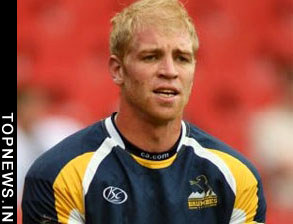Australian sports stars live charmed lives
 Sydney - When rugby player Shawn Mackay was knocked down while crossing the road outside a night club in the early hours of the morning there was no speculation in the Australian media that alcohol may have played a part in his death.
Sydney - When rugby player Shawn Mackay was knocked down while crossing the road outside a night club in the early hours of the morning there was no speculation in the Australian media that alcohol may have played a part in his death.
Most local cricket fans were happy to go along with the story that a diet pill his mother gave him was to blame for bowler Shane Warne failing a drug test.
There was an outpouring of sympathy for swimmer Nick D'Arcy who was kicked off the team for a bar-room assault that earned him a criminal conviction and his victim life-long injuries.
Sports stars live a charmed life in Australia.
Shine at throwing and catching, kicking a ball or lapping the pool, and you can get to live by different rules.
Tennis player Lleyton Hewitt, known to foreigners for his racist outbursts and bratty behaviour, became Young Australian of the Year. Cricketers abuse opposing players and adopt win-at-all-costs tactics - and yet are held up as role models.
"If there's one problem in Australian sport at the moment it's the notion that everything is justifiable so long as you get the win at the end of the day," said former rugby captain and author Peter Fitzsimons.
Rugby player Brett Steward was charged last month with the rape of a 17-year-old. After his committal hearing, at which he was granted bail, court officers saw fit to shield him from television cameras.
Club manager Grant Mayer was willing to meet the press.
"Our only focus right now is to ensure Brett returns to the field this Sunday and can help the side get that first win," he said.
John Doherty wrote a letter to The Sydney Morning Herald complaining that Stewart had been given preferential treatment.
"I wonder if a 24-year-old man with an Arabic name, from a western suburb, with no public profile, charged with sexual intercourse without consent would receive bail?" he asked.
Sports administrators can seem to operate outside the norm.
Since the Helsinki Olympics in 1952, only four countries have won more medals than Australia. This success is ascribed to the lavishly funded Australian Institute of Sport (AIS) and its coaches poached from former Soviet bloc countries. Yet AIS director Peter Fricker rails against local coaches who take up posts abroad.
"We've been far too generous," he said. "We've been feeding overseas systems, giving away too many secrets of our success."
Swimming coach Ken Wood, 78, was castigated in the press for being unpatriotic by working with foreign swimmers.
"I'm a swimming coach, I coach swimmers, that's what I do," Wood remonstrated.
Australians can get so steamed up about winning because sporting prowess is a national obsession.
Here's Prime Minister Kevin Rudd on the subject: "Part of Australia's global standing lies in the fact that we have such an enormously competitive nation on the international field of sporting endeavour, and the Olympics, and in other elite sports as well. It's part of who we are as a country."
New York University academic Tunku Varadarajan said bad behaviour was forgiven if the team won.
"Australia does not play an ugly game, but its methods and mien are seldom beautiful," Varadarajan said. "Australia's cricketers care not whether they are loved, except by their own fans who, having drunk deeply of the same cultural cup as their cricketers, celebrate hard-nosed methods."
Many Australians deplore the double-standards, the special treatment, the blind eye turned to misdemeanours, the too-cosy relationship between the media and the stars.
"For a sporting nation, we're not very sporting," said well-known sports commentator Tracey Holmes. (dpa)